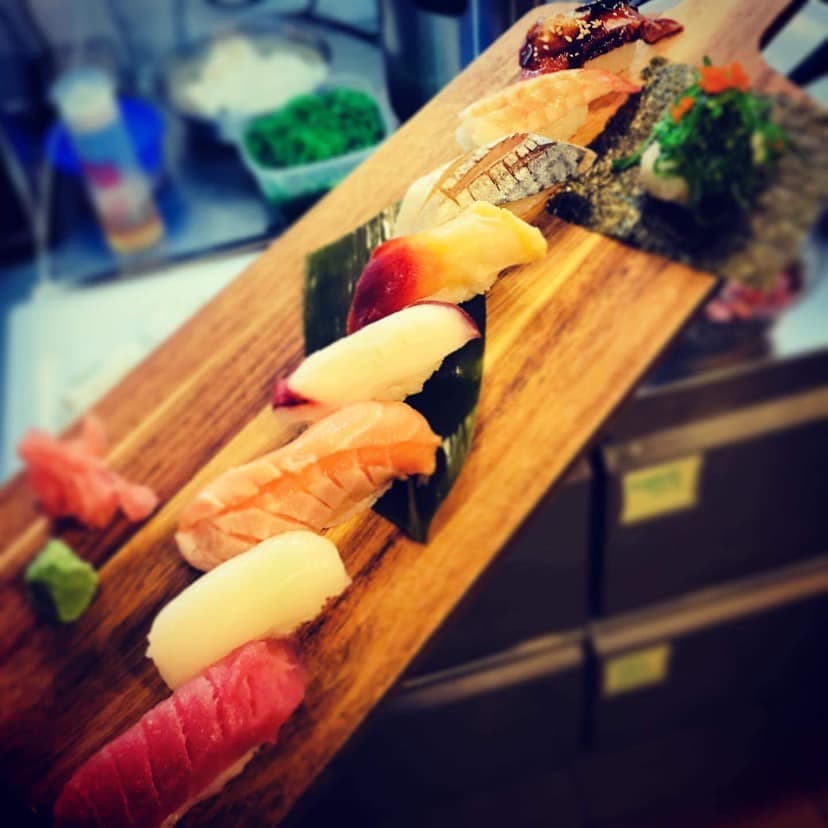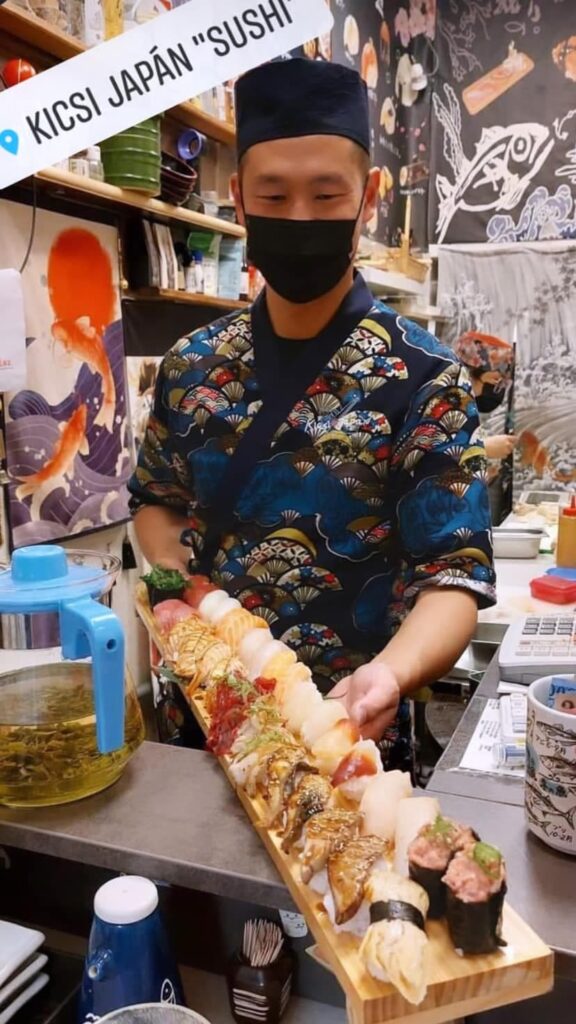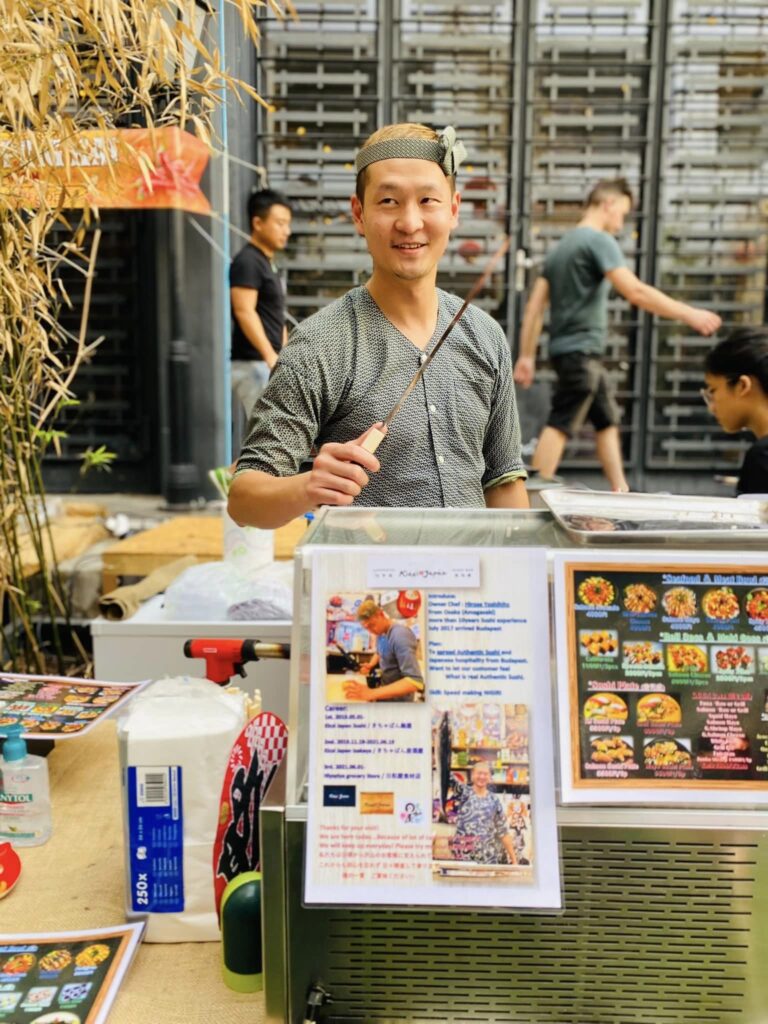No questions, no doubts – defenitely the best sushi restaurant in Budapest, in my opinion. It’s one of the very few Google Maps reviews I’ve ever written:
It’s not cheap, but the difference compared to any other sushi place is astounding. It’s truly incredible how much variation there can be in the world of sushi. You don’t need to be a gourmet to appreciate it, because not everyone might discern the distinction between fresh, wild-caught, non-frozen, and farm-raised salmon. But if nothing else, anyone who’s ever had sushi elsewhere will immediately notice the difference in the rice quality. The chef is clearly a perfectionist – it’s probably not by chance that there’s a photo of Jiro from ‘Jiro Dreams of Sushi‘ on the wall. The fact that we can pour homemade soy sauce into the ceramic dishes made by the chef himself says a lot. We regularly return. Favorites: Scallop and grilled liver nigiri, seaweed salad.
It’s been three years, but nothing has changed when it comes to the quality of Kicsi Japán. Yes, there are the other top contenders like Fuji, Sushi Sei, and Nobu, but when we’re talking about the authentic japanese vibe, none of them can quite compare to this restaurant.

The moment you step inside, it’s like walking through a dimensional gate; you’ll immediately feel as if you’ve been transported to a traditional Japanese izakaya. I won’t lie, the first time might feel a bit cramped, but trust me, it’s all part of the authentic Japanese experience. By your second or third visit, you’ll grow accustomed to it, and by the fourth, you’ll be pleasantly surprised by how close-knit you’ve become with the staff and even the other guests.
During the challenges posed by the COVID-19 pandemic, I had genuine concerns about their survival. However, Hirose, the owner (or ‘Hiro‘ for friends), proved to be a true hero. Not only did he weather the storm, but he also expanded the originally modest-sized restaurant with an additional room.
How was this possible? What kind of person can achieve such a feat? Here comes the story behind the counter.
I usually start with a “Where are you from?” question, but I know you’re from Osaka because you were so kind to help with some hints when I traveled to Japan. So, Hirose, did you originally learn to be a chef, or did you have any other profession before you became one?
Actually, I don’t have any other. When I was living in Japan, I did many kinds of work, mostly part-time. I felt I needed different experiences to find my way. Maybe I tried too many. 🙂 Like tour conductor,office work,moving company,factories,and worked at various types of restaurants.
So obviously at one point you started to learn to be a chef. Where does it come from? Why did you think that it would be good for you to be a chef?
I didn’t think about the whole thing, really. I was young. In those times, I didn’t think too much. 🙂 I had a job as a chef in an izakaya where I worked in the kitchen, and later I went to another one. There I met a chef who was my boss also company owner and was very strict.

It can be good sometimes.
Yes. He made a very strong impression on me. There were so many things to learn and do each day that I had to accomplish. And I was like always defeated, so it was a very big pleasure when I did something properly in the way he requested. But mostly I am defeated because it was really hard, so I wanted to show him, and I tried as hard as I could, and it changed me.
Where did it happen? In which city?
That time I lived in Shanghai.
Amazing! So, you’ve worked in China too.
Yes. Before Budapest, I lived there.
I see. And what did your parents think about you deciding to be a sushi chef?
You know my mother is a very strict person too. First, she wanted me to go to college. I went there, but I didn’t like it and wanted to do something else. I also have a little sister, and I think my mother may be more focused on her later. 🙂 So I was free. But she [Hirose’s mother] was supportive too.
So you feel college is not for you, you’ve tried many different jobs, and at the end, you decided to go abroad, China. When did this happen?
It was around 2012.
As I know, working abroad is not so popular in Japanese society. What did your friends think about that?
Yes, sure. Most of them didn’t want to let me go, but some encouraged me.
So you are in Shanghai, under the command of a very strict sushi chef master. Struggling day to day to meet his standards. Do you have some or any particular memory from those times? If yes, what is the most memorable?
You know, those times were so hard that all I remember is working almost non-stop. This was a running sushi restaurant where the sushi plates went round and round on a conveyor belt. Before opening, everything had to be ready then [after the guests arrived] we needed to refill the belt continuously. To achieve this, I had to manage 3 different places. In the backside kitchen, make hot dishes in another place, and behind the counter, make sushi as fast as I can according to the high standards set by my boss.
It sounds extremely hard.
Yes, and he was always like, ‘Why didn’t you do this? Why didn’t you finish that already?’ Luckily, I had a colleague a bit older than me. If he wouldn’t be there with me, maybe I would give up and quit.
You mean you helped each other to survive. Do you know what happened to him?
He stayed in Shanghai, and now he has 2 different companies, as I remember he has 6-7 restaurants there now.
Why did you decide to come to Hungary?
After 2 years working at this company, the company wasn’t working so well financially as planned. Then there came a bigger more successful company that took it over, but it will result in having a new owner, new staff. The old company owner and most of the staff members had to leave, which was my plan too. Since I worked my way to the management position in the old company, new company owner asked me to stay and help them out with the transition. I decided to stay with them for 1 year only. Through hard work the new company got more stable and worked well than the previous company. I felt very proud of that. Since everything was doing well, I thought I can go on my own path now. I have handed in my resignation. Now that I am free, I was thinking maybe I should open my own restaurant back home in Japan. Meanwhile there was a business man, my regular customer, he offered me a partnership, opening a sushi restaurant in Budapest.
Was he Hungarian?
He was Chinese. He told me that he has a place in Budapest and he is willing to invest.
What language do you speak with each other?
Mostly in English, but I understand some Chinese.
So, that was the reason you came here. What did you know about Hungary? What did your friend and your family think about it when you told them that you wanted to come here?
You know, it was a sudden decision, and I knew almost nothing about Hungary. My mother told me it’s too far and a bit risky.
Sure she did, she’s a mother after all.
Ok. So you landed at Budapest airport, spent your first days looking around. Was it some kind of a culture shock for the first time in Europe after Asia?
No, not at all. I really like to experience new things, go to new places. Honestly, I wanted even more.
So you really are an adventurer kind of type.
As much as I decided to come here because I already knew how to run a restaurant in China, it would be easier to open a restaurant there or in Japan, but here I have to start from zero. But this was much more challenging.

When did this happen?
In 2017.
What should one do first before opening a sushi restaurant? What did you guys start with?
We went to explore other Japanese restaurants to get more information about the European preferences regarding Japanese food, interior and such. We went to a few of the places in Budapest.
What was the result?
I was surprised. It was different from what I was used to in Japan. The taste was good or ok, but the ratio of the fish and the rice condition was strange for me. There was too much rice and too small portions of fish.
Was there someone else who helped to open the restaurant? I mean like the paperwork, to get familiar with the city, etc. Is there a Japanese community to turn to?
Yes, there is Japanese community, but I didn’t have much time to contact them since I had too many things ahead of me, which I regret now, because it could have helped me out more during this time.
Sorry to hear it. So what do you do in your little or less freetime?
I have two dogs; I walk with them regularly and I like to go to onsens [spas].
Back to work! You started with a Chinese partner and based on the actual situation, you obviously quit at one point and started your own as you always wanted to. What about the staff? Did you do everything by yourself?
No, one of my colleagues from the previous place helped me. She helped with paperwork at the beginning and later on with the cashier. The first place was so small I didn’t need more staff.
Do you cook the same way at home like here in the restaurant?
No, it’s different. At home, I take it easy. In the restaurant, I’m always trying to make the food better and better, and I keep thinking about new dishes.
Is there some kind of a nation-wide traditional way to make a specific sushi? In other words, the only difference between two cucumber maki made by two different chefs is how perfectly can one or the other follow the one and only way to make it? If not, are they different by region? Or does every chef intentionally make it different?
I think all the chefs try to make it a bit different. The only exception is if the same company with more restaurants may have a standard.
What is your favorite Hungarian food?
Csirke paprikás.
Wow! Perfect pronunciation. What is the first dish that you are eager to eat when you go to Japan because you can’t have it here? Or you can have it but it never has the same taste as there.
Sushi. 🙂
You’re kidding me.
I really like it but ok, Yakiniku. It’s something like BBQ meat but not the same.

What would you suggest to eat for someone who comes to you and wants to try sushi for the first time?
I think the best would be the sushi plate and the grilled sushi plate.
I can assure it. These are my favorites too. Especially the grilled one. What is your best-selling sushi?
In Japan, the most traditional is the nigiri type. Less rice, more topping, so the latter is more dominant. But here, I would say the makis and sushi rolls are popular. Because of this, it is more challenging for me. I always try to find the taste that the regular customers liked the most just to achieve my goal to make it more popular. If I have the time, I even customize sushi according to my customer. And now they order them much more often. So I’m very happy that I could do it. However the most important part is keep the fish, meat and vegetables as fresh and of perfect quality as possible. And I always keep this standard.
It really sounds like a great success of some kind of a gastro-cultural crusade for the benefit of the customers. What do you mean you customize sushis per customer?
If the restaurant is not so overcrowded, and I can see the customer who ordered what, I make the same sushi for him/her the way I think he/she would like it the most. For example, for kids, I’m putting less wasabi into it. I can even make the rice softer by pressing it a bit more when I’m making the form. If I see or know someone eating the sushi with chopsticks [traditionally the nigiri should be eaten by hand] I make it a different way to make it easier to hold.
Fantastic. I never heard of such a service quality.
It’s worth it because it’s a very good feeling for me when a customer is satisfied.
It’s like a reward, one of the best things in a job like this. What about the opposite side? What do you like the least about running a restaurant?
When something is out of control. Like I wanted to extend the restaurant sooner, and I was in need of the perfect staff. It was very hard to find the proper employees.
I bet it is. I remember those days when every time I came I saw new faces – except your still most loyal employee, the incredibly professional and exceptionally kind lady from Nepal. What does a working day look like? How does it start? What do you do first?
Usually, I start here [at the restaurant] one hour before opening. And these days are easier because of the staff. They help me prepare the ingredients; however, there are some tasks that are always done by me, like preparing the salmon in a special way for the miso soup to make its taste even better, or cutting the fishes for the sushi.
I was wondering how many kilos of rice you have to cook per day.
It’s about 10 Kgs on a busy day, which becomes 20 Kgs after cooking. On a less busy day, it’s about 7-8 Kgs uncooked.
Where do you buy the ingredients?
Some of them are directly from Japan, like yuzu. It’s a fruit that has a juice taste like a mix of orange and lime. I use it with vinegar and soy sauce for sashimi [a raw fish plate] made of white fish. Some ingredients come from the local market. I go for them personally and check them by myself before buying them.
I imagine it and can’t stop thinking immediately of Jiro Ono, one of the most famous sushi chefs in the world whose picture was on the wall behind you for a long time. He did the same and bought the ingredients by himself every morning for many years. Unfortunately, I didn’t eat at his famous sushi bar ever, but I had the chance to take a selfie in front of the restaurant. 🙂
I did the same and have one photo too! 🙂

Do you? It’s terribly funny! 🙂 So we both admire him. Customers again. What is the ratio between the foreign and local customers? More Hungarians or more tourists from abroad?
I think it’s 50:50 on average. It depends on what part of the year. In the summer, it’s obviously more tourists.
Last one. Let’s play a silly game! Imagine that you win the lottery. You don’t have to work anymore for a living. You have all the money till you retire. Would you continue this business? Or would you expand?
I would expand it. I would buy new furniture, redesign the whole interior. Then open more restaurants. Then at the end, when I become old, I still come back here and I can run it by myself.